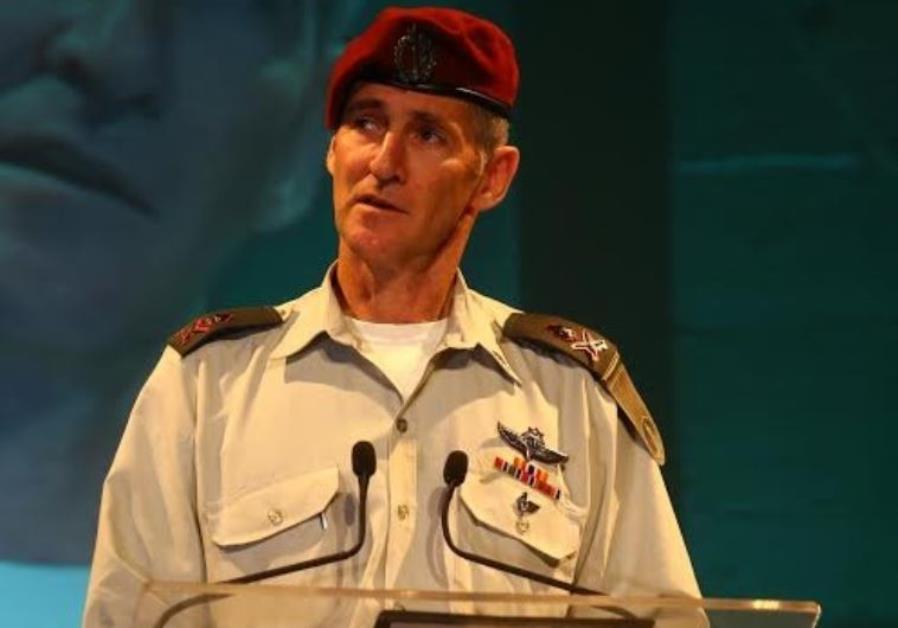Ex-IDF deputy chief: Beware of Gulf states, their values are different than ours

IDF Maj.-Gen. Yair Golan gives a speech at Kibbutz Tel Yitzhak in central Israel. (photo credit: ASSAF SHILO / ISRAEL SUN)
Israel should solidify its control over the Golan Heights, deal more closely with the Kurds, and be careful in its relationship with the Persian Gulf countries because their set of values are significantly different than Israel’s, Yair Golan, until recently the IDF’s deputy chief of staff, said Tuesday.
Golan, speaking at a Jerusalem conference entitled “New realities in the Eastern Mediterranean,” said that Israel now has a “strategic opportunity” to make the Israeli presence on the Golan Heights permanent, something he said is “crucial to the security of Israel.”
He bewailed the fact that Katzrin, the largest community in the Golan Heights with some 7,000 people, only grows by less than 2% a year. “This is a shame,” he said. “There should be a city of 20,000 to 25,000 people in the Golan in the next 10 years.”
Golan said that Israel has three main interests concerning the Syrian front: keeping the border calm, which is something Israel can influence; preventing the transfer of more sophisticated weapons through Syria to Hezbollah, something Israel can influence but not block completely; and minimize Iranian designs for hegemony in Syria.
Regarding Iran’s aspirations, Golan acknowledged, Israel has little influence, and to do that needs the help of both the United States and Russia.
“We need the presence of the US in the region, mainly in Iraq and the northeastern part of Syria as much as possible – no doubt about it,” he said. He added that with the American presence there, and American support to the Kurds, “we can in a way mitigate the Iranian influence in the region.”
Likewise, he said, Israel needs a very good relationship with Russia, because “the destiny of Syria to a large extent will be determined by Russian activity and its willingness to minimize or limit Iran’s influence in Syria.”
Regarding Lebanon, Golan said that Israel needed to “convince the world that the government of Lebanon has some responsibility for the negative things inside Lebanon.” He said that it is unacceptable that the world accepts that a sovereign government “has no responsibility for all kinds of malign things happening on its soil. This is totally unacceptable and we should say it loudly and convince the world that something must be done.”
Golan said that a future war with Hezbollah, as horrible as it may be, would also give Israel an opportunity to “defeat the Iranian project in Lebanon.” This is something Israel should focus on and “do in the most decisive way in any future conflict,” he said.
According to Golan, the Kurds in Syria and Iraq are a “new and almost sovereign entity in the region,” and a moderate element with whom Israel should work to expand their relationship “as much as possible.” This is something that would help mitigate Iran’s influence as well, he said.
While saying that it is encouraging to see ongoing relations between Israel and the Gulf States, Golan asserted that “we should be careful regarding the Gulf. We may find common interests, but rely on a different set of values. We should not over-emphasize this relationship, but anything we can do [to expand it] is very important.”
Regarding the Palestinian issue, Golan said that Israel’s approach to the matter can be characterized by those who are in favor of separation from the Palestinians, and those who are in favor of annexing the territories.
The tension between these two approaches defines much of the internal Israeli conflicts, he said. “Just managing or handling the conflict is probably not enough for the future,” he said. “When I look at the future, Israel should make up its mind, what to choose, where are we headed in order to stabilize the situation.”
Golan said that the most significant external threat facing Israel comes from Iran and its proxies, but that Israel has “all the possible tools to deal with this threat.”
The second challenge, he said, is the one imposed by the Palestinians. He said the influence of that threat is not only on security, but also something that will define the nature and “prospects of Israel’s future.”
“I believe the destiny of Israel will be determined more in Gaza, Ramallah and Jerusalem, than in Tehran, Damascus and Beirut,” she said.
The conference was sponsored by the Jerusalem Institute for Strategic Studies and B’nai B’rith International.
Join Jerusalem Post Premium Plus now for just $5 and upgrade your experience with an ads-free website and exclusive content. Click here>>






Comments are closed.